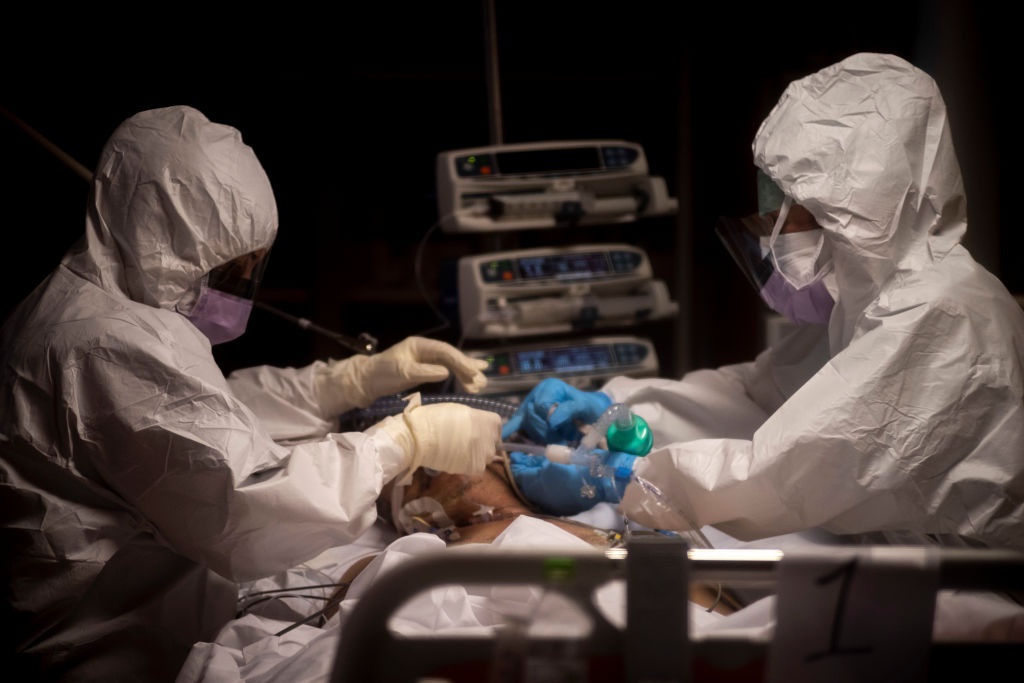


Doctors treat Covid-19 patients in an intensive care unit at a hospital in Rome, Italy.
Antonio Masiello/Getty Images
- The Western Cape saw a large number of visitors to the province at the end of March, the province’s head of health says.
- This may have contributed to the earlier “seeding” of cases at cluster areas like supermarkets.
- Predictions are complex and not exact, but South Africans can expect to live among the virus until a vaccine is created.
The Western Cape’s status as an iconic tourism destination may have contributed to its early and rapid rise in Covid-19 cases relative to the rest of the country.
This was speculated during the province’s weekly digicon update on Thursday on the Western Cape’s battle with the pandemic.
Asked why the Western Cape had ended up with the most Covid-19 cases in South Africa, the Western Cape Department of Health’s head, Dr Keith Cloete, said it may have been significant that there had been “quite a lot of people who visited the Western Cape” at the end of March.
READ | Western Cape expects to hit Covid-19 cases peak in coming weeks
These included tourists from outside South Africa, and returning locals, who had visited overseas.
This had led to local community transmissions in the Western Cape far sooner than elsewhere in South Africa, and these transmissions had led to “clusters” of infections in sites like supermarkets, the digicon heard.
“Those seeds were planted towards the end of March,” Cloete reported.
As soon as the provincial health department had become aware of these local transmissions, they had immediately expanded their Covid-19 testing regime to include locals, in these emergent clusters, who may have had no particular international exposure.
Modelling
Now, three months later, when asked about the latest various predictions, by different modellers, Cloete said forecasting was “like looking into a crystal ball”, and there were “too many variables” to produce a singular prediction.
As a “responsible” government, the provincial health department was “erring on the side of conservatism”, on “pessimistic scenarios”. They would “rather over-provide than under-provide” – in terms of the resources they prepared to have ready, such as hospital beds.
Cloete warned: “Until there is a vaccine, we are going to live with Covid” – even once deaths and hospitalisations begin decreasing.
READ | Covid-19: Elderly, staff feeling the trauma of outbreaks at old age homes
Recruitment of healthcare workers was proceeding to mitigate levels of absenteeism, due to sick staff.
Department of Local Government HOD Graham Paulse said numerous discussions and negotiations were under way to prepare for a potential increase in deaths, and a subsequent increase in the need for undertakers and funerals.
Cloete asked employers to consider “people at risk”, based on their age, and with specific comorbidities, “to allow them to have as little exposure as possible to Covid-19”.
Western Cape Premier Alan Winde said everyone shared the responsibility to “slow the spread… as we’re getting closer and closer to the peak”.
Test samples
This is now expected in late June – starting next week.
In other news, Cloete advised that the National Health Laboratory Service (NHLS) was now only processing test samples that they had received in the past 48 hours – this after processing a massive previous backlog of cases.
In a subsequent statement released by Winde, the provincial government said: “The Western Cape Department of Health was notified today that all samples currently being processed at the National Health Laboratory Service labs in the Western Cape have been received in the past 48 hours.
“This means that the backlog in testing, which reached up to 27 000 tests at its worst, has now been completely cleared.
“We will continue to track the situation to determine whether the NHLS can continue to process tests without developing a new backlog before reviewing our decision to implement a risk-adjusted testing strategy which focuses on providing testing to residents which need it most – including healthcare workers, those already in hospital, those over the age of 55, people in old aged homes and people with comorbidities, which would put them at additional risk.
“We thank the NHLS for their hard work to resolve the backlog and President Cyril Ramaphosa and [Health] Minister Zweli Mkhize for intervening when the Western Cape raised their concerns about the backlogs.”

